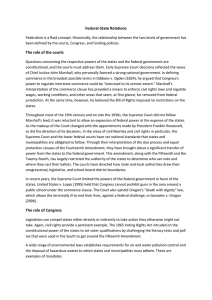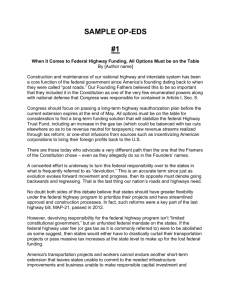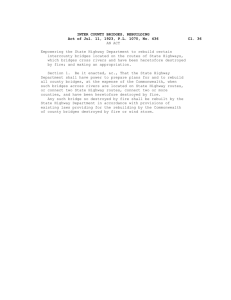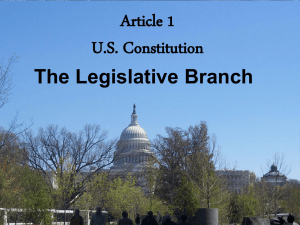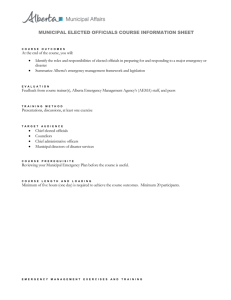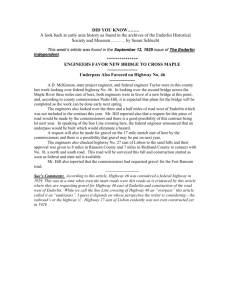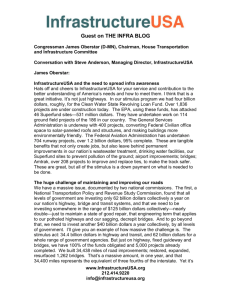September 10, 2015 Letter to NJ House Delegation Urging Action
advertisement
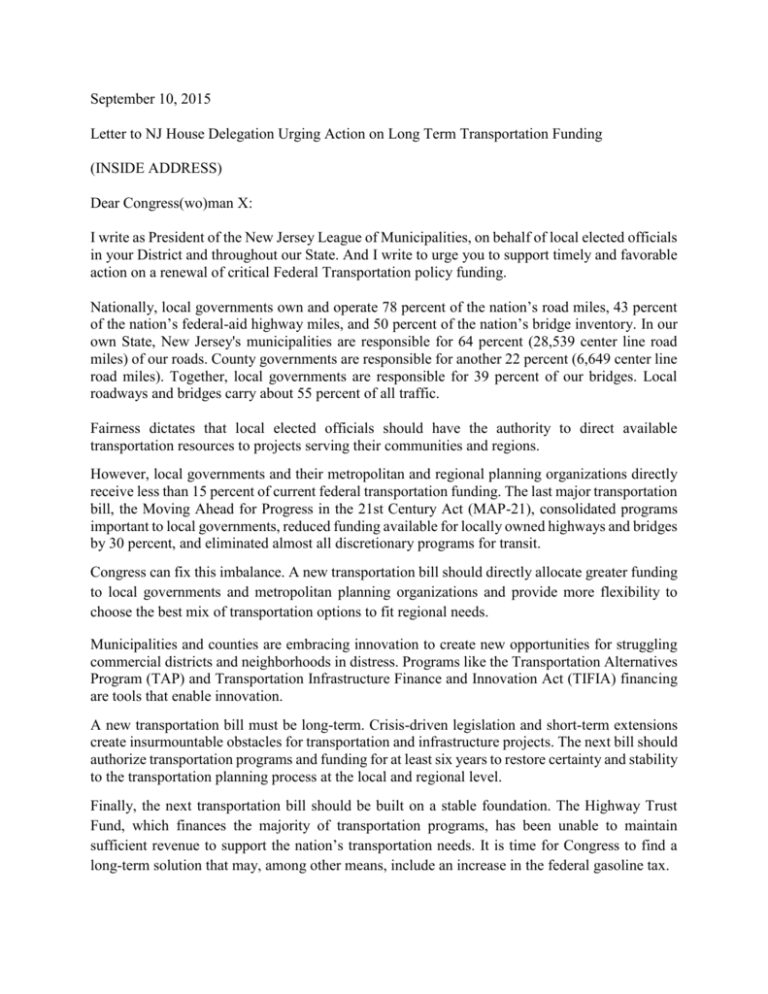
September 10, 2015 Letter to NJ House Delegation Urging Action on Long Term Transportation Funding (INSIDE ADDRESS) Dear Congress(wo)man X: I write as President of the New Jersey League of Municipalities, on behalf of local elected officials in your District and throughout our State. And I write to urge you to support timely and favorable action on a renewal of critical Federal Transportation policy funding. Nationally, local governments own and operate 78 percent of the nation’s road miles, 43 percent of the nation’s federal-aid highway miles, and 50 percent of the nation’s bridge inventory. In our own State, New Jersey's municipalities are responsible for 64 percent (28,539 center line road miles) of our roads. County governments are responsible for another 22 percent (6,649 center line road miles). Together, local governments are responsible for 39 percent of our bridges. Local roadways and bridges carry about 55 percent of all traffic. Fairness dictates that local elected officials should have the authority to direct available transportation resources to projects serving their communities and regions. However, local governments and their metropolitan and regional planning organizations directly receive less than 15 percent of current federal transportation funding. The last major transportation bill, the Moving Ahead for Progress in the 21st Century Act (MAP-21), consolidated programs important to local governments, reduced funding available for locally owned highways and bridges by 30 percent, and eliminated almost all discretionary programs for transit. Congress can fix this imbalance. A new transportation bill should directly allocate greater funding to local governments and metropolitan planning organizations and provide more flexibility to choose the best mix of transportation options to fit regional needs. Municipalities and counties are embracing innovation to create new opportunities for struggling commercial districts and neighborhoods in distress. Programs like the Transportation Alternatives Program (TAP) and Transportation Infrastructure Finance and Innovation Act (TIFIA) financing are tools that enable innovation. A new transportation bill must be long-term. Crisis-driven legislation and short-term extensions create insurmountable obstacles for transportation and infrastructure projects. The next bill should authorize transportation programs and funding for at least six years to restore certainty and stability to the transportation planning process at the local and regional level. Finally, the next transportation bill should be built on a stable foundation. The Highway Trust Fund, which finances the majority of transportation programs, has been unable to maintain sufficient revenue to support the nation’s transportation needs. It is time for Congress to find a long-term solution that may, among other means, include an increase in the federal gasoline tax. In May, I travelled to Washington and testified on the need for Congress to enact a long term transportation infrastructure policy. With the Federal Highway Trust Fund slated to run out of money at the end of that month, I appeared before the United States Senate Commerce, Science and Transportation Committee’s Subcommittee on Surface Transportation and Merchant Marine Infrastructure, Safety and Security. Noting the progress and prosperity that followed the passage of the Interstate Highway Act, 60 years ago, I told the Committee If we want the best for our people, our businesses and the future of our children, we need to imitate the intelligence and the integrity exhibited by President Eisenhower and our leaders in Congress in 1956. The economic case for investment in our long-term infrastructure is clear-we know it will grow the economy, create good jobs, and position us for long-term growth. The moral case for action is just as plain. Will we leave the costs of disinvestment to our children? The current stop-gap extension will expire at the end of October. The time for action is now. Please support reliable funding for a long-term transportation policy bill that gives appropriate resources and discretion to local elected officials. Thank you for all you do for the people and the local governments of our Garden State. Please contact Jon Moran at jmoran@njslom.com or 609-695-3481, ext. 121 if you have any questions or concerns. Very truly yours, Brian C. Wahler, President NJ League of Municipalities and Mayor, Piscataway Township

